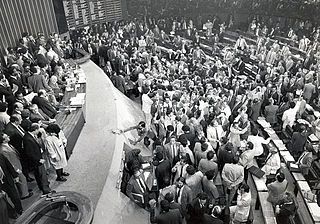
A constitutional monarchy, parliamentary monarchy, or democratic monarchy is a form of monarchy in which the monarch exercises their authority in accordance with a constitution and is not alone in decision making. Constitutional monarchies differ from absolute monarchies in that they are bound to exercise powers and authorities within limits prescribed by an established legal framework.

An institutional referendum was held in Italy on 2 June 1946, a key event of Italian contemporary history.
The abolition of monarchy and anti-royalism is a legislative or revolutionary movement to abolish monarchical elements in government, usually hereditary.

Itamar Augusto Cautiero Franco was a Brazilian politician who served as the 33rd president of Brazil from 29 December 1992 to 31 December 1994. Previously, he was the 21st vice president of Brazil from 1990 until the resignation of President Fernando Collor de Mello. During his long political career Franco also served as Senator, Mayor, Ambassador and Governor. At the time of his death he was a senator from Minas Gerais, having won the seat in the 2010 election.

Elections in Venezuela are held at a national level for the President of Venezuela as head of state and head of government, and for a unicameral legislature. The President of Venezuela is elected for a six-year term by direct election plurality voting, and is eligible for re-election. The National Assembly (Asamblea Nacional) has 165 members (diputados), elected for five-year terms using a mixed member majoritarian system. Elections also take place at state level and local level.

Politics of the Empire of Brazil took place in a framework of a quasi-federal parliamentary representative democratic monarchy, whereby the Emperor of Brazil was the head of state and nominally head of government although the Prime Minister, called President of the Council of Ministers, was effectively the de facto head of government, and of a multi-party system. Executive power was exercised by the government. Legislative power was vested in both the government and the two chambers of the General Assembly. The Judiciary was independent of the Executive and the Legislative. There was also a fourth power, the Moderating power, exercised by the emperor. The Empire of Brazil was divided into 20 provinces and the Neutral Municipality, capital of the country.

During its independent political history, Brazil has had seven constitutions. The most recent was ratified on October 5, 1988.

Elections in Portugal are free, fair, and regularly held, in accordance with election law.

The present Constitution of Portugal was adopted in 1976 after the Carnation Revolution. It was preceded by a number of constitutions including the first one created in 1822, 1826, 1838, 1911, and 1933.

Brazilian history from 1985 to the present, also known as the Sixth Brazilian Republic or New Republic, is the contemporary epoch in the history of Brazil, beginning when civilian government was restored after a 21-year-long military dictatorship established after the 1964 coup d'état. The negotiated transition to democracy reached its climax with the indirect election of Tancredo Neves by Congress. Neves belonged to Brazilian Democratic Movement Party, an opposition party that had always opposed the military regime. He was the first civilian president to be elected since 1964.

The unicameral National Assembly is Niger's legislative body. The National Assembly may propose laws and is required to approve all legislation.

A parliamentary republic, or parliamentarian constitutional republic, is a republic that operates under a parliamentary system of government where the executive branch derives its legitimacy from and is accountable to the legislature. There are a number of variations of parliamentary republics. Most have a clear differentiation between the head of government and the head of state, with the head of government holding real power, much like constitutional monarchies. Some have combined the roles of head of state and head of government, much like presidential systems, but with a dependency upon parliamentary power.

A constitutional referendum was held in Greece on 29 July 1973. The amendments would confirm the abolition of the monarchy by the military junta and establish a republic. The proposal was approved by 78.6% of voters with a turnout of 75%.

The Republic of Niger has had seven constitutions, two substantial constitutional revisions, and two periods of rule by decree since its independence from French colonial rule in 1960. The current "Seventh Republic" operates under the Constitution of 2010.

Republicanism in Spain is a political position and movement that holds that Spain should be a republic.

The movement for the re-adoption of monarchy in Brazil has taken place as a series of uprisings and political acts, usually in a fragmented way and peripherally to larger causes. It has been important historically and remains a fast-growing active movement to this day. It advocates restoration of the constitutional monarchy under the House of Orléans-Braganza, a cadet branch of the House of Braganza, which ruled Brazil for 67 years as the Empire of Brazil until the monarchy was abolished in 1889 by a military coup d'état that gave rise to the First Brazilian Republic.

Parliamentary elections were held in Portugal between 10 and 27 December 1820. They followed the Liberal Revolution on 24 August. These were the first parliamentary elections in Portugal. This election aimed to form assemblies in three levels: parochial, provincial, and the Constituent Cortes of 1820.













